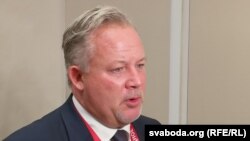OSCE observer mission chief says Belarus elections were 'in no way free and fair'
| Publisher | Radio Free Europe/Radio Liberty |
| Publication Date | 12 September 2016 |
| Cite as | Radio Free Europe/Radio Liberty, OSCE observer mission chief says Belarus elections were 'in no way free and fair', 12 September 2016, available at: https://www.refworld.org/docid/58189d7cf.html [accessed 18 May 2023] |
| Disclaimer | This is not a UNHCR publication. UNHCR is not responsible for, nor does it necessarily endorse, its content. Any views expressed are solely those of the author or publisher and do not necessarily reflect those of UNHCR, the United Nations or its Member States. |
September 12, 2016
 OSCE special coordinator Kent Harstedt says it is impossible to rely on official election results in Belarus.
OSCE special coordinator Kent Harstedt says it is impossible to rely on official election results in Belarus.
MINSK – The chief of the short-term OSCE observer mission in Belarus says the September 11 parliamentary elections were "in no way free and fair."
Kent Harstedt from the Organization for Security and Cooperation in Europe told RFE/RL in Minsk on September 12 that "there were so many violations that they did not meet international standards."
There were some improvements in the way the elections were held, Harstedt said.
But he added that it was impossible to rely on the official results as Belarus needs to change its election laws and regulations for the registration of political parties.
Earlier, Belarus's Central Election Commission (CEC) said two opposition figures had won seats in the next parliament.
Hanna Kanapatskaya of the United Civil Party and independent candidate Alena Anisim are the first opposition parliamentarians to win seats in 20 years. Parliament has been dominated by allies of the country's strongman president, Alyaksandr Lukashenka.
The CEC reported that turnout was 74.32 percent.
Belarus has not held a vote that was assessed free or democratic since the early 1990s, and authorities routinely punish dissent and keep a tight lid on the media in the post-Soviet country of around 10 million people.
Based on reporting by Reuters and Interfax
Link to original story on RFE/RL website
